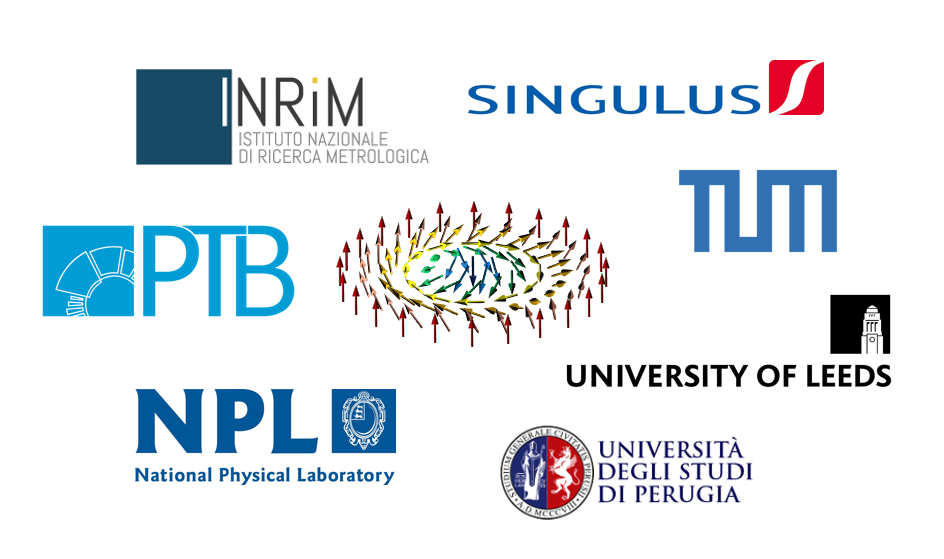Participants TOPS

PTB has extensive expertise in quantitative MFM and transport measurements; FMR of magnetic nanomaterials; ultrafast optical and THz measurements, and growth and transport studies of quantum resistance standards. So far, PTB has coordinated 4 EMRP/EMPIR projects in nanomagnetism and ultrafast electronics (MetMags, SpinCal, NanoMag, Ultrafast).
contact: Mark Bieler
INRIM has expertise on magneto-optic Kerr effect measurements; DC and HF characterisation of magnetic thin films and nanostructures; preparation of patterned magnetic and metallic structures; theoretical and numerical description of magnetization (domain wall, vortex, skyrmion) dynamics; INRIM has coordinated the iMERA Plus Nanospin project and was WP leader in 3 EMRP/EMPIR projects in nanomagnetism (MetMags, SpinCal, NanoMag).
contact: Michaela Kuepferling
NPL has a broad experience in quantum electrical metrology and specifically quantum resistance metrology based on novel quantum materials (i.e. graphene). NPL brings in vast expertise in functionalised SPM, including quantitative MFM, variable temperature & variable field MFM, MFM combined with magnetotransport measurements and MFM equipped with customised magnetic probes (i.e. suitable for 3D sensing and visualisation of exceptionally small magnetic features). NPL will mainly contribute with a broad range of functional (e.g. magnetic and electrical) SPM techniques, magnetic and magnetotransport (including atomic scale transport) for the characterisation of TSS samples.
contact: Olga Kazakova
Singulus is the leading European tool maker providing field-proven, large-area, high-throughput production PVD equipment for depositing ultrathin layers and layer-stacks for magnetic storage and magnetic sensors. Singulus took and takes part in a number of European funded FP-7 and Horizon 2020 projects (NEXT, Magwire, spot, WALL, PRIME, GREAT). Singulus will mainly be involved in WP5 for dissemination and possible exploitation of the results.
contact: Jürgen Langer
TU Munich has a long history of state-of-the-art single crystal growth of intermetallic compounds, measurement of transport and bulk properties in bulk and nano-systems under extreme conditions, as well as neutron diffraction and spectroscopy. Starting with the first identification of skyrmions in chiral magnets, a broad range of pioneering studies have been carried out by TUMunich establishing the basis of the emergent electrodynamics of chiral magnets as well as the fundamental properties of skyrmions. Recent activities were funded through the ERC Advanced Grant TOPFIT. TUMunich is also a main contributor to the Collaborative Research Centre TRR80 of the German Science Foundation and a co-initiator of the upcoming priority program SPP2137 on Skyrmonics by the German Science Foundation.
contact: Christian Back
University Leeds has long-established and globally recognised expertise in its Condensed Matter Physics group in many aspects of nanomagnetism and spintronics including the synthesis and characterisation of magnetic thin films and multilayers and transport measurements thereof as well as applying THz techniques to spintronic materials. In particular, the group was instrumental in developing the bubble expansion method for measuring DMI in thin films and continues to develop it. ULeeds currently participates in the H2020 FET-OPEN programme MAGicSky and the FP7 ITN WALL, hosts the Marie Skłodowska Curie fellowship VChiral-Spin and has acted as co-ordinator for ITNs Ultrasmooth and SpiniCur.
contact: Christopher Marrows, Bryan Hickey
University Perugia has extensive expertise in the exploitation of both conventional and micro-focused Brillouin Light Scattering (BLS) for the study of the dynamical properties of nanostructures, ultrathin films and multylayers. Moreover, it has a consolidated expertise in the experimental study of spin waves in magnonic crystals and in the determination of the DMI constant in layered materials. The UPerugia group has been recently involved in EU funded projects such as “Mastering Magnons in Magnetic Meta-Materials” (2009-2013) under FP7 and “Landauer” (2012-2016) under H2020. Moreover, UPerugia has recently coordinated the National Relevant Project “DyNanoMag” (2013-2016), with other five national partners, including INRIM.
contact: Silvia Tacchi

